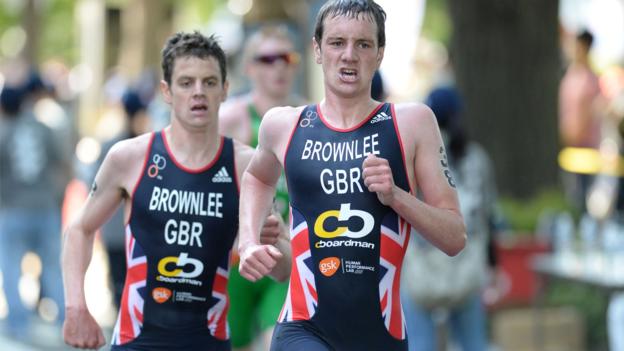
The Brownlee brothers are extremely talented and competitive athletes who have gained great success in their sport of triathlon. Alistair, the older brother, is a two-time Olympic champion, while Jonny, two years his junior, won the Olympic silver medal in 2016 and a bronze medal in 2012. At the final race of the World Triathlon Series last year, Jonny was leading the race with 700m to go when he slowed down and tottered to a water station, suffering badly from dehydration. His brother Alistair was vying for second place with another athlete when he saw his brother was in trouble so he sacrificed his own chances and went to him, put Jonny’s arm over his shoulder and all but carried him to the finish line before pushing him over it in front of him, whereupon Jonny crashed to the ground and required urgent medical attention. It was reported that Alistair explained that, “if it had happened to anyone, I would have helped them across the line. It’s an awful position to be in.”
by Tim Middleton

There is another wonderful story widely read on the internet of a young boy in New York with special needs called Shaya. The young boy had never known what it was like to play sport, let alone to win, as no-one wanted him to be on their team, as they knew they would have less chance of winning. When he was walking past a baseball match, his father asked if his son could join one of the teams. Grudgingly, they agreed, as they were losing significantly, but made no promise that Shaya would bat. At the climax of the match, Shaya’s team had caught up and had an excellent chance of winning when Shaya’s turn came to bat. Shaya did not even know how to hold the bat, let alone hit the ball. Yet his new team allowed him to bat. Instead of taking advantage of this, the opposition pitcher gently lobbed the ball towards Shaya to give him a chance but Shaya missed. One of his team-mates came and helped him to hold the bat and incredibly hit the ball, even if only a few metres. Everyone told Shaya to run though it would have been easy for the fielder to throw run Shaya out. Instead the fielder threw the ball far away so that Shaya could make it to first base. With the crowd now urging Shaya to continue to run, the next fielder also threw the ball in a direction that would enable Shaya to reach the next base. Even the opposition fielders were shouting encouragement to Shaya to run — and he did, all the way to home plate, whereupon both sets of players lifted him high on their shoulders in recognition of him winning the game for his team.
What these two stories perhaps show is that there are some things that are more important than winning, that compassion is more appealing than competition. While there is a similarity between competition and compassion, in that people are driven by passion in both competition and in compassion, the two are very different. Compassion is perhaps the antithesis of competition. Competition is about beating others, about stopping others from reaching their goal, about looking for our own fortune, about being number one, about being fast and first. Compassion, in turn, can be seen as being about helping others, about enabling others, about being concerned for others’ misfortunes, about being fair. We tend to measure our worth and value through competition, unwisely, but more importantly we will show others’ value and worth through compassion.
At the same time, we can note that compassion is the antidote to competition. Competition can, by its very nature, become a poison that infects not only ourselves but others also — we have to win at all costs. Compassion can counteract that by restoring a balance in our thinking and acting.
Compassion is not feeling pity or being sorry for others; it is not simply about being kind to others. It is not even caring for our friend but rather it is caring for our opponent, even (and especially) in victory; it is showing concern for the misfortunes, sufferings and disappointments of others. It is reaching out to others in their time of need, as we would hope they would do to us.
We tend to teach our children to be competitive, to stand up for their rights, to fight for their goals; we need also to teach them to be compassionate, to stand up for others’ rights, to help others reach their goals. We need to teach them to bear one another’s burdens. We need to show them that caring for others is important. We need to teach them that, as the song goes, “his welfare is my concern”, that “he ain’t heavy; he’s my brother”. Just ask the Brownlees. Just ask Shaya.
- Chamisa under fire over US$120K donation
- Mavhunga puts DeMbare into Chibuku quarterfinals
- Pension funds bet on Cabora Bassa oilfields
- Councils defy govt fire tender directive
Keep Reading
Tim Middleton is the executive director of the Association of Trust Schools and author of the book on “failure” called Failing to Win. email: [email protected] website: www.atschisz.co.zw











